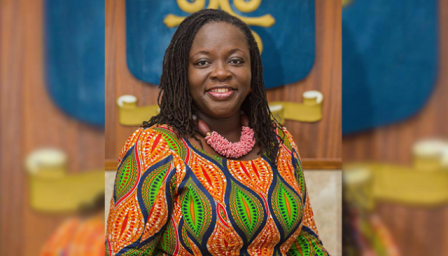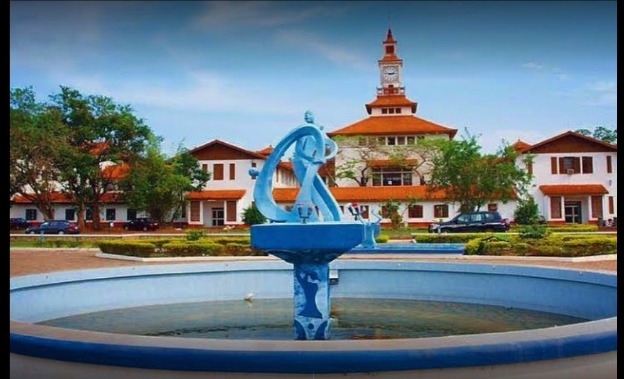Elizabeth Frances Sey, the first female to obtain a degree from the University of Ghana, graduated in 1953 - just 5 years after the establishment of the school. But it took 70 years to get a woman to lead the same university which had been producing female graduates for 65 years.
At the students’ front, it took 59 years after the establishment of the University to get a female elected as leader of the Students Representative Council. Since then, two more have occupied that high office, even though one’s tenure was interim.
The decades of female absence in positions of influence within the University and even outside of it, are evidence of the subtle patriarchal wiring of the Ghanaian society. For instance, in Parliament, out of 275 members, there are only 35 female MPs. The figure represents only 12.75% of the entire Parliament
In the past decade or so, there has been a significant reversal of this rather unequal outlook of representation and decision making in Ghana. Joyce Adeline Bamford-Addo, first woman Speaker of Parliament, Justice Rtd. Georgina Theodora Wood, first woman Chief Justice, Akosua Frema Osei-Opare, first woman Chief of Staff, and a host of other powerful women who were the first females to have occupied such roles.

Globally, efforts are being made increase the number of women playing important roles in various disciplines. In politics and governance, sports, and corporate leadership, deliberate efforts are being made to encourage women participation.
At the University of Ghana, an affirmative action policy was introduced at the student level to increase female enrolment especially in male-dominated programmes and staff positions. This, together with the conscious mentoring of young female academics and staff members, has been a major strategy employed by the University, even before the publication of a recent study on gender disparities in Ghana’s tertiary education system.
The study published by Kimberly Christel mentioned sexual harassment and an absence of female authority figures as contributory factors. It appears to me that these issues are being tackled head-on at the University of Ghana. The results of these efforts are beginning to be seen, at least in more ways than one.
Apart from being the first and only tertiary institution to have all of its current principal officers as women, University of Ghana currently has about 50% of its central administration heads as females. The University is also seeing an increasing number of females, head its academic units.
In a more immediate impact of these efforts, the University of Ghana, which is the country’s biggest tertiary institution, has registered a higher female to male ratio for the first time in recent history. In the latest admission cycle, the University recorded a 51:49 female-to-male admissions ratio, exceeding its target set for female enrolment.
Partly due to the University’s equitable admission policy, many females are now able to pursue higher education in even some of the most male dominated courses.
I have met two brilliant ladies from the Information Technology and Computer Engineering departments - Angela and Alhassan.
Angela enrolled to study Information Technology with a grade point of 11; a programme that has just about 20% of its population currently being female.
Alhassan, on the other hand, gained admission to study Computer Engineering with a grade point of 12. At the moment, she is working with a multinational tech company in Accra. Less than a quarter of students (22.1%) currently taking the Computer Engineering programme are females.
Without the affirmative action policy, Angela, Alhassan, and several thousands of other females might have had to rethink their career choices or at worst, forever deal with what would have been an inconsiderate system.
This, in my opinion, makes a compelling case for University of Ghana's commitment to achieving Sustainable Development Goal 4 which calls for actions to ensure inclusive and equitable quality education.
What other strategies have been adopted?
In 2006, the University established the Centre for Gender Studies and Advocacy (CEGENSA), a unit mandated to promote advocacy and initiate policies on gender in the University. This has greatly aided "efforts towards gender mainstreaming," Vice-Chancellor, Prof. Nana Aba Appiah Amfo says.
In keeping with its goal of becoming a top-tier tertiary institution, the University adopted about nine strategic priorities almost a decade ago. Ensuring "gender and diversity are enshrined in all aspects of its institutional culture, in a way that sets the example for all other academic and non-academic institutions to follow", was one of those priorities.
In a few days, University authorities will take another step in its commitment to increasing access to females through the launch of a gender policy.
“Since the female gender has been the underrepresented gender for many years, there has naturally been an emphasis on making sure that females feel comfortable in the university and harassment of all kinds are minimized,” Prof. Amfo expressed.
Almost a decade ago, the University adopted a sexual harassment and misconduct policy as part of efforts to create a safe space for females within its community. This policy also established an anti-sexual harassment committee which conducts investigations and issues sanctions against culprits.
What are the results?
Currently, there are more female undergraduate students at the University than males.
At the master's and Ph.D levels, things are different. Again, there are more male students with disabilities at the University than female students.
There is a steady rise in the number of females pursuing programmes such as Material Science and Engineering, Agricultural Engineering, Sports and Physical Cultural Studies and Information Technology, and Computer Engineering.
Female enrollment in Midwifery, Family and Consumer Sciences, and Nutrition and Dietetics, are at their highest, data from the University indicates.
Despite these, the Vice-Chancellor, Prof. Amfo, believes that even though the University is a leader in fostering a gender-balanced atmosphere, there is still much work to be done.
“We need to work towards having more female role models across disciplines and in leadership positions to continue to inspire younger women. We still have a lot more male lecturers and senior administrators and professionals and more in the senior ranks. The current optics of having females in significant leadership positions also help in motivating the females.”
The way forward
It is commendable that Ghana's oldest and largest University has demonstrated such a strong commitment to foster a gender-balanced community because it has paved the way and showed other academic and non-academic organizations that it is feasible.
Various stakeholders must come together in support of the University to achieve even more as it seeks and chart this noble path.
Also, at the national level, there is the need to move away from the rhetoric and start implementing policies that will create safe and enabling spaces for women to hold high offices.
—
The author holds a Bachelor of Arts Degree in Communication Studies from the Ghana Institute of Journalism. He is a fact-checker with Dubawa Ghana and a Civil/Public Servant.
Latest Stories
-
Why African team shine at home but struggle at the Club World Cup
1 minute -
New Lawra MCE Adam Muazu, dies after a short illness
13 minutes -
Establishment of W.E.B. Du Bois Memorial Centre was a visionary move by Rawlings – Yaa Asantewaa
23 minutes -
Ghana’s silent killer: Dr. Yankson highlights deadly impact of poor sanitation
34 minutes -
Inflation to witness another sharp decline in June 2025 to 16% – Report
50 minutes -
Republic Bar & Grill Marks 13 Years with Burkina Faso Solidarity Concert
50 minutes -
GH₵1 Energy levy likely to return amid sector pressures – Dr Theo Acheampong
57 minutes -
Ghana is uniquely positioned to leverage AI to lead innovation in Africa – Deloitte Transactions Partner
1 hour -
3 pupils, taxi driver killed in crash near Winneba Junction
1 hour -
Economy to grow by more than 4.8% in 2025 – IC Research
1 hour -
US visa tips: 10 key insights revealed by the US Consul General on Joy FM’s SMS
1 hour -
Scars of Hooliganism: ‘It’s the worst thing you can think of’ – Maxwell Konadu on violence
2 hours -
NIA workers declare strike action over withheld allowances
2 hours -
Rehoboth Properties responds to allegations of power theft at Kweiman Estate
2 hours -
Your social media activity can affect your student visa application – U.S. Consul General
2 hours

